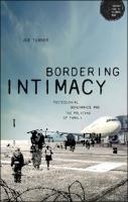Explore

Bordering intimacy is a study of how borders and dominant forms of intimacy, such as family, are central to the governance of postcolonial states such as Britain. The book explores the connected history between contemporary border regimes and the policing of family with the role of borders under European and British empires. Building upon postcolonial, decolonial and black feminist theory, the investigation centres on how colonial bordering is remade in contemporary Britain through appeals to protect, sustain and make family life. Not only was family central to the making of colonial racism but claims to family continue to remake, shore up but also hide the organisation of racialised violence in liberal states. Drawing on historical investigations, the book investigates the continuity of colonial rule in numerous areas of contemporary government – family visa regimes, the policing of sham marriages, counterterror strategies, deprivation of citizenship, policing tactics, integration policy. In doing this, the book re-theorises how we think of the connection between liberal government, race, family, borders and empire. In using Britain as a case, this opens up further insights into the international/global circulations of liberal empire and its relationship to violence.
This book is included in DOAB.
Why read this book? Have your say.
You must be logged in to comment.
Rights Information
Are you the author or publisher of this work? If so, you can claim it as yours by registering as an Unglue.it rights holder.Downloads
This work has been downloaded 190 times via unglue.it ebook links.
- 190 - pdf (CC BY-NC-ND) at OAPEN Library.
Keywords
- Borders
- British Isles
- Citizenship
- empire
- Europe
- Family
- Feminist theory
- Geographical Qualifiers
- International relations
- intimacy
- Political Science & Theory
- Politics & government
- postcolonial
- Race
- Society & Social Sciences
- Sociology
- Sociology & anthropology
- thema EDItEUR::1 Place qualifiers::1D Europe::1DD Western Europe::1DDU United Kingdom, Great Britain
- thema EDItEUR::J Society and Social Sciences::JH Sociology and anthropology::JHB Sociology
- thema EDItEUR::J Society and Social Sciences::JP Politics and government::JPA Political science and theory
- thema EDItEUR::J Society and Social Sciences::JP Politics and government::JPS International relations
- United Kingdom, Great Britain
- Violence
Links
DOI: 10.7765/9781526146946Editions

